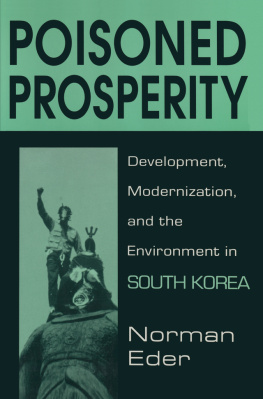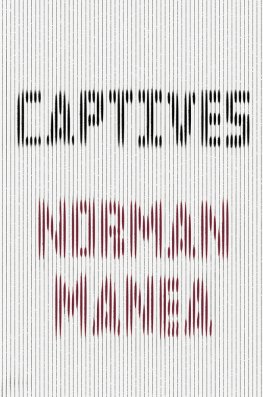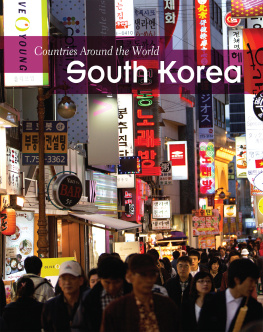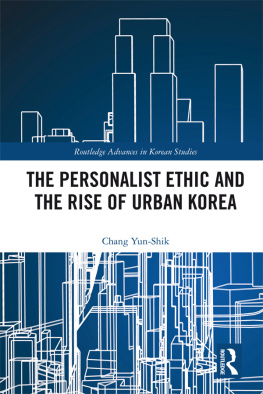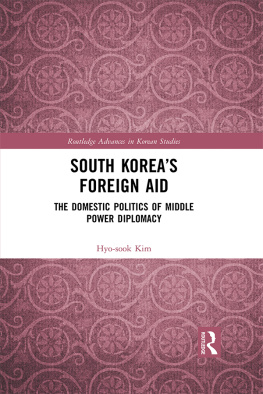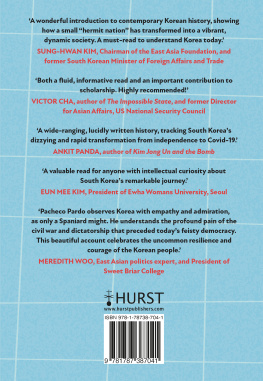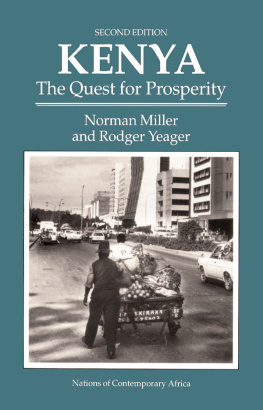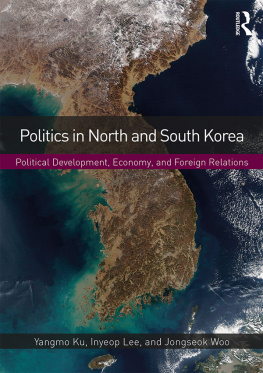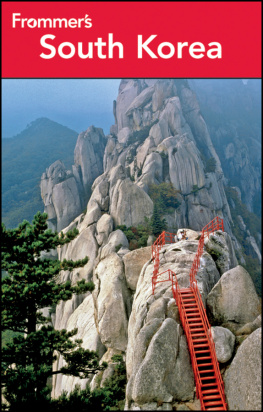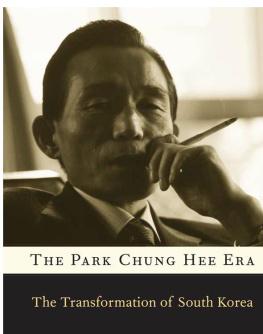POISONED PROSPERITY
Poisoned Prosperity
Development, Modernization, and the Environment in South Korea
Norman Eder
First published 1996 by M.E. Sharpe
Published 2015 by Routledge
2 Park Square, Milton Park, Abingdon, Oxon OX14 4RN
711 Third Avenue, New York, NY 10017, USA
Routledge is an imprint of the Taylor & Francis Group, an informa business
Copyright 1996 Taylor & Francis. All rights reserved.
Map of Korea on page xi is from Korean Dynasty: Hyundai and Chung Ju Yung by Donald Kirk. Published by Asia 2000 in Hong Kong and M. E. Sharpe. Used with permission.
No part of this book may be reprinted or reproduced or utilised in any form or by any electronic, mechanical, or other means, now known or hereafter invented, including photocopying and recording, or in any information storage or retrieval system, without permission in writing from the publishers.
Notices
No responsibility is assumed by the publisher for any injury and/or damage to persons or property as a matter of products liability, negligence or otherwise, or from any use of operation of any methods, products, instructions or ideas contained in the material herein.
Practitioners and researchers must always rely on their own experience and knowledge in evaluating and using any information, methods, compounds, or experiments described herein. In using such information or methods they should be mindful of their own safety and the safety of others, including parties for whom they have a professional responsibility.
Product or corporate names may be trademarks or registered trademarks, and are used only for identification and explanation without intent to infringe.
Library of Congress Cataloging-in-Publication Data
Eder, Norman R.
Poisoned prosperity: development, modernization, and the
environment in South Korea / by Norman R. Eder.
p. cm.
An East Gate book.
Includes bibliographical references and index.
ISBN 1-56324-686-4 (hardcover: alk. paper).
ISBN 1-56324-687-2 (pbk.: alk. paper)
1. Environmental policyKorea (South)
2. Korea (South)Environmental conditions. I. Title.
GE190.K6E33 1995
363.7'0095195dc20
95-34229
CIP
ISBN 13: 9781563246876 (pbk)
ISBN 13: 9781563246869 (hbk)
Contents
| Photographs follow pages 74 and 134 |
| Chapter |
The Human and Environmental Costs of
Industrialization |
The History and Structure of Environmental
Administration in Korea: A Brief Overview |
Realities and Limits of Environmental Law and
Management in Korea |
The Forces for Change: Prosperity, Democratization,
and Internationalization |
Nongovernment Organizations: Environmentalism
and Civic Democracy |
My studies in Korea as a Senior Fulbright Scholar were made possible by the financial, intellectual, and emotional support provided by the Korean-American Educational Commission; the Army Environmental Policy Institute; my home institution, Oregon Graduate Institute of Science & Technology; and Hanyang University. Although the views expressed on these pages are my own, I owe a tremendous debt to the many people who shared their ideas and insights with me about a remarkable nation and its people.
Fred Carriere, former director of the Fulbright program in Seoul, Senator Mark O. Hatfield, and Col. James Thayer (ret.) each encouraged me to pursue my interests. Dr. Dwight Sangrey, former president of OGI, provided me with the opportunity to leave my administrative post to pursue my research in Korea. Dr. Shin Eung-Bae, director of Hanyang University's Environmental Research Center, was my constant intellectual mentor, confidant, and guide. His wife, Kim Kyung-Sook, made sure that we were never far from personal help and advice when we needed Korean life explained.
Dr. James Hartman and Ernest Eddy, of the U.S. Eighth Army, provided thoughtful and experienced counsel as well as hard questions. Dr. Hong Wuk-Hee, senior scientist at the KEPCO Environmental Research Centre, urged me to keep my sights high and to work to explain his country to mine. Robert Donaldson and Dr. Mel Gurtov were wonderfully insightful editors, and Dr. Adriano Gasperi, Tam Ormiston, and Dr. Ray Weisenborn all kept me going with their enthusiasm and understanding for the frustrations of a newly minted student of Korean affairs. The careful reading and editorial insight provided by Nancy Christie and Michelle De Lude immeasurably improved the manuscript long after my own patience had worn thin. And special thanks to Dr. George Hazelrigg of the National Science Foundation, whose curbside study, 100 Uses of Re-bar, provided me with a unique touchstone for understanding Korean life and attitudes.
The views expressed in this book were indelibly shaped by many Koreans who openly shared their ideas with me in extensive interviews and numerous informal discussions. I give special thanks to Choi Joo-Sub, Dr. Kim Jung-Wk, Dr. Kwak Il-Chyun, Kwon Hyon-Youl, Lee Jina, Lee Sang-Duk, Dr. Lee Su-Hoon, Nam Sang-Min, Dr. Rho Yung-Hee, Shin Chang-Hyun, and Dr. Yoo Jae-Hyun. I also am most appreciative of the willingness of Dr. Chung Chin-Seung to trust me with his thoughtful unpublished manuscript. These and many others made every effort to graciously recommend a curious American, armed only with a laptop computer, to their friends and colleagues. In them all, I discovered the essential Korean spirit that assumes that all things are possible.
The author wishes to thank Korea Federation of Environmental Movements (KFEM), Center for Environmental Development, and Green Korea for their contribution of photographs for this book.
The production of this study was most of all a family event. Sherry, Benjamin, and David consented to taking a sabbatical from their lives in quiet Portland, Oregon. They tackled bustling Seoul with abandon and mostly good cheer: even in the face of my poor grocery shopping habits, a cold winter, and life without a car. Finally, this book would not have been written had it not been for our extended Korean family, Dr. Hwang Wan-Young and Professor Suh Cha-Young and their two sons. Their long-standing friendship, deep trust, and warm kindness made even the impossible possible.
Over the past thirty years there has been a dramatic revolution in human thinking about nature and the earth's environment. The protection of the environment is no longer seen exclusively as a series of limited local, national, or regional problems. Today, it has emerged as an international question. The internationalization of the environment was first formally recognized in 1972, when the United Nations sponsored the Conference on the Human Environment in Stockholm to raise the issue of environmental decay to the international stage. Twenty years later the global importance of the environment was enshrined by Agenda 21 at the culmination of the 1992 United Nations Conference on Environment and Development (UNCED) in Rio de Janeiro. During this international conference on environment and development, world leaders and environmental activists laid a broad and principled foundation for global attention to the global environment.

